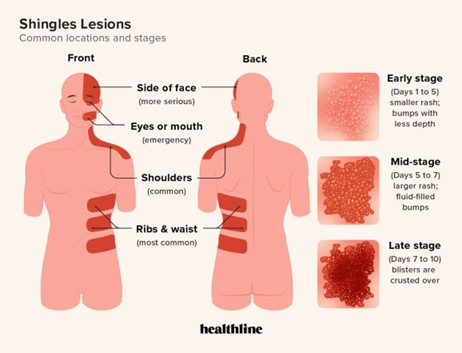A nurse is assessing a client who is receiving continuous IV fluids through a peripheral IV. Which of the following findings indicates to the nurse that the client is experiencing fluid overload?
Fever
Crackles in the lungs
Bradycardia
Flattened neck veins
The Correct Answer is B
Crackles in the lungs indicate that the client is experiencing fluid overload. When there is an excess of fluid in the body, it can accumulate in the lungs and cause crackles. The other
a. Fever is not a sign of fluid overload.
c. Bradycardia (a slow heart rate) is not a sign of fluid overload.
d. Flattened neck veins are not a sign of fluid overload; distended neck veins may be a sign of fluid overload.

Nursing Test Bank
Naxlex Comprehensive Predictor Exams
Related Questions
Correct Answer is A
Explanation
When providing change-of-shift report about a client who has shingles, the nurse should include information about the type of transmission-based precautions in place to prevent the spread of infection to other clients and staff. Shingles is caused by the varicella-zoster virus and can be spread through direct contact with the rash.
- The times for routine vital sign measurements may be important information to include in the report, but it is not specific to the client's condition of shingles.
- The client's background health history may be important information to include in the report, but it is not specific to the client's condition of shingles.
- The number of visitors the client had during the shift may be important information to include in the report, but it is not specific to the client's condition of shingles.

Correct Answer is C
Explanation
Tightening the abdominal muscles prior to moving helps to stabilize the spine and prevent back strain. This is an important technique for caregivers to use when assisting a client who is immobile and requires repositioning in bed.
a. Twisting at the waist while pulling the draw sheet can cause strain on the back muscles and should be avoided.
b. Keeping the legs straight does not provide more power in the lift and can also cause strain on the back muscles.
d. Placing the bed in the lowest position does not necessarily prevent back strain and is not related to the proper technique for repositioning a client in bed.
Whether you are a student looking to ace your exams or a practicing nurse seeking to enhance your expertise , our nursing education contents will empower you with the confidence and competence to make a difference in the lives of patients and become a respected leader in the healthcare field.
Visit Naxlex, invest in your future and unlock endless possibilities with our unparalleled nursing education contents today
Report Wrong Answer on the Current Question
Do you disagree with the answer? If yes, what is your expected answer? Explain.
Kindly be descriptive with the issue you are facing.
